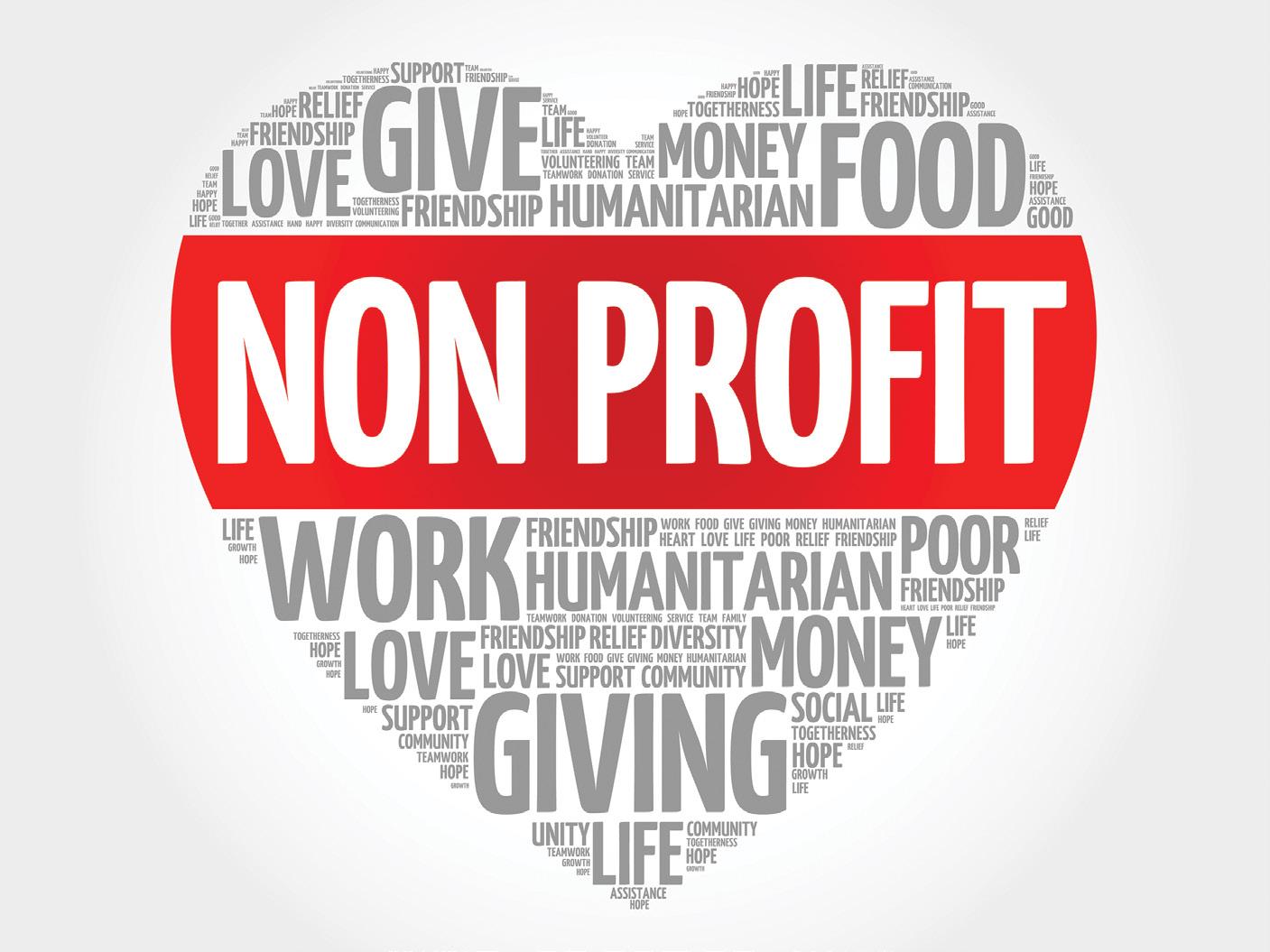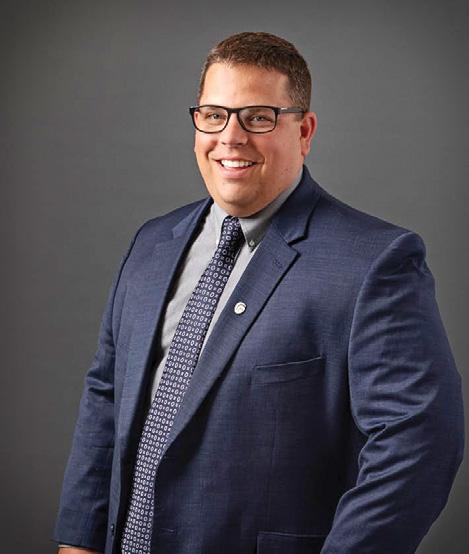
9 minute read
ACCOUNTING & AUDITING
COVID-19 and Nonprofits
Big changes — and big differences between grant- and contribution-funded organizations
Numerous factors (both internal and external) can affect the success of nonprofits’ fundraising and recruitment efforts, but the effects of the COVID-19 pandemic on these organizations — as in nearly every sector and industry — have often been more far-reaching than anything we’ve seen before. In a recent Wipfli LLP survey of nonprofits , three primary concerns emerged: employee burnout, fundraising and recruitment. As nonprofits navigated the early months of the pandemic, many found themselves facing the challenge of keeping staff and volunteers safe as they provided essential services. Fundraising naturally became a challenge, as communities faced a unique level of need. Yet these effects were not felt equally across nonprofits. Grant-funded clients (GFP) for the most part remained open throughout 2020. Many received stimulus funding — sometimes in the millions of dollars. For those groups, careful documentation of how they are spending this money will be a top concern. This is especially true for those who have not yet (or only recently) received the funds and now must determine how to spend that money while staying within the confines of the grants’ parameters. These GFP organizations were able to continue serving their communities, thanks in large part to that funding. Their core staff continued working to provide essential services — many times in response to exacerbated community need. These workers might now be facing increased burnout.
By Denes Tobie, CPA
In contrast, many community-based nonprofits, most of whom are contribution funded, were required to close their doors for indefinite periods. Their primary means of fundraising — local in-person events — was shuttered. For these organizations, the pandemic made it impossible to conduct business as usual for staff and visitors as well as those they served. One silver lining was the unexpected success of virtual fundraising drives, many of which exceeded previous years’ efforts. Any community-based groups that received pandemic funding will also need to focus on staying on the right side of any regulatory demands — which might be an even bigger challenge for organizations unused to managing the ins and outs of government funding. For almost all nonprofits, the pandemic magnified — albeit in different ways — internal challenges and opportunities for improvement. The need to conduct virtual fundraising events,
to enable remote work for nonessential services, to deploy safety measures for volunteers who continued to work in person, to stay connected with colleagues and to implement electronic or digital functionality in their time-keeping all exposed the importance of technology for efficient and effective operations. As a result, a common need this year for many nonprofits is likely to be more robust and digitally ready financial software. Many organizations — especially communitybased nonprofits — found that their current solutions simply weren’t sufficient for remote work. These systems lacked appropriate internal controls, which were vital as staff attempted to conduct work remotely. Time-keeping also became a pain point for nonprofits that didn’t have electronic solutions in place. Some organizations didn’t have sufficient equipment, such as laptops, to support a remote workforce. Another area of impact was internal control systems. Many nonprofits took a conservative approach, requiring multiple signatures to approve invoices or sign checks. Without staff centered in the same physical location, these processes required an update. While painful in the moment, these updates are likely to result in greater efficiency and flexibility for these organizations going forward. Nonprofits would be well-advised to devote time to documenting these new procedures and developing standard procedures for using them going forward. For nonprofits who found themselves needing to update technologically, another focus this year will likely be on evaluating those changes for long-term appropriateness. In the rush to implement products and services for specific and urgent needs, many will benefit from taking a second look at how best to train staff on correct usage. Some systems or software might also have additional functionality or optimization features that could provide additional advantages for nonprofits. With the current rate of retirements, and through all the changes impacting the current work environment, nonprofits will need to continue to address engagement in the workplace. As painful as the past 18 months have been, the pandemic necessitated changes across the nonprofit sector that are likely to have a positive impact going forward. Many organizations were pushed, albeit under high stress, to make changes that were in fact quite necessary and that will help them to operate more effectively in the long run. Others were inspired to find new ways of engaging donors and serving their clients. And some were prompted to make difficult programming decisions that might lead to greater efficiency and more targeted community support. Our job as their trusted advisers is to continue listening to our nonprofit clients, help them make the most of these opportunities and prepare for the new future as we emerge from this hectic time.

Denes Tobie, CPA, is a partner with Wipfli LLP. She serves nonprofits and government agencies, specializing in audits, nonprofit consulting, training and regulatory compliance. Contact her at 608-270-2929 or dtobie@wipfli.com.
VOLUNTEER OPPORTUNITY HIGHLIGHTS
Joining a WICPA committee or serving on a board is a great way to network with like-minded individuals, sharpen communication abilities, gain leadership skills, form business relationships and friendships and strengthen your brand. They are also ways to “give back” to the profession that has given you so much. Sharing talent as a volunteer enhances the CPA profession while helping others achieve ambitious goals. The WICPA board of directors, the Educational Foundation board of directors and the Ethics Committee, all highlighted here, are currently accepting volunteers. To be considered for the WICPA board of directors or the Educational board of directors, to join the Ethics Committee or to find out more about any other volunteer opportunities, contact Tammy Hofstede, WICPA president & CEO, at tammy@wicpa.org or 262-785-0445, ext. 4518.
WICPA BOARD OF DIRECTORS
The WICPA Board of Directors provides strategic governance in accordance with the WICPA strategic plan, mission and vision. The board ensures the WICPA serves the diverse needs of members, enhances professional competency, promotes the value of members and the profession, advocates on behalf of the profession and builds community among members.
Chair
Angela C. Thomas, Expenditure & Revenue Accounting Section Chief, Wisconsin Department of Natural Resources
Chair Elect
Steven Pullara, Tax Partner, BDO USA LLP
Past Chair
Wendi Unger, Partner, Baker Tilly LLP
Secretary/Treasurer
Lucien Beaudry, Equity Shareholder, Reinhart Boerner Van Deuren s.c.
ETHICS COMMITTEE Directors
Jeff Dewane, Assistant Controller, Vinton Construction Company John Heindel, Business Partner, Lauber Business Partners Ruth Kallio-Mielke, Managing Director, Deloitte & Touche LLP Kyle Stephens, VP of Finance and Administration, Craft Beverage Warehouse LLC Stacy Stinson, Assistant Professor of Accounting, Concordia University
AICPA Council Ryan Hanson
Neil Keller, Partner-in-Charge, Tax Services, Sikich LLP Your involvement in the WICPA can positively help shape the professional that you become. You will not find relevance by only paying the membership dues, so take an active role in building social capital for yourself and your business. Serving on the WICPA board of directors is an excellent way to do this — and it provides you the opportunity to learn about and help govern your professional organization. — Angela C. Thomas, Board Chair
Our committee receives cases from the AICPA Professional Ethics Executive Committee (PEEC) after a detailed investigation by the Joint Ethics Enforcement Program (JEEP). We review the findings and the responses from the CPA or CPA firm in question and either concur or nonconcur with the recommended remedial actions to be taken. In some ways, our contribution is a bit of detective work, knowledge of the Rules of Professional Conduct as set forth and a desire to bring honor and satisfaction to our hard work as CPAs. If you play by the rules and aren’t afraid of making tough decisions, our committee is for you. — Barry Sattell, Committee Chair
The Ethics Committee oversees the effective regulation and enforcement of the AICPA Code of Professional Conduct.
Chair Barry Sattell Members
Wayne Ehlert, Partner, Baker Tilly LLP Carrie Gindt, Partner, Reilly, Penner & Benton, LLP
John Knepel
Barbara Pippenger, Senior Accountant, Gordon J. Maier & Company LLP Terry Strittmater, Principal, CLA
WICPA EDUCATIONAL FOUNDATION BOARD OF DIRECTORS
The WICPA Educational Foundation plays a pivotal role in supporting programs to improve awareness and perceptions by educating students and educators about the exciting opportunities available to accounting professionals.
Chair
Paul Frantz, Baker Tilly LLP
Secretary Roberta Ward Directors
Mark Bichler, Business Education Teacher, Port Washington High School Jon Gaines, VP Business Services and Finance, Wisconsin Women’s Business Initiative Corp. Jessica Gatzke, Shareholder, Scribner, Cohen and Company S.C. Jessica Horning, Financial Reporting Manager, Medical College of Wisconsin Kale Post, Manager, Dwayne Johnson & Associates Wendy Potratz, Senior Lecturer, University of Wisconsin–Oshkosh Bret Priaulx, Senior Manager, Deloitte & Touche LLP Jose Saenz, Director, Advancement Gift Services, Marquette University
Board Liaison
Lucien Beaudry, Equity Shareholder, Reinhart Boerner Van Deuren s.c. The Educational Foundation board has given me a platform to engage with the future leaders of our profession and provided me with the opportunity to share my professional journey while helping to shape those coming behind. The conversations have been rewarding on many fronts. — Paul Frantz, Educational Foundation Board Chair


Join the WICPA Board of Directors!
The WICPA is seeking members to serve on its board of directors.
• Staying up to date on professional issues • Providing strategic governance in accordance with the WICPA strategic plan, mission and vision
Opportunities include:
• Acquiring new leadership and training skills
Applicants must be WICPA CPA members in good standing. A “CPA member” is defined as a WICPA member who has obtained a certificate as a CPA from the Accounting Examining Board of the State of Wisconsin, or from a similar legally constituted authority in any other state, possession or territory of the United States or the District of Columbia. To apply, visit
wicpa.org/BoardApplication
through Nov. 15, 2021.
Questions? Contact tammy@wicpa.org.
WHAT’S BETTER THAN CALLING ANY TIME YOU NEED ADVICE ABOUT PRACTICE SUPPORT AND RISK MANAGEMENT?

REACHING KNOWLEDGEABLE EXPERTS.
CAMICO® policyholders know that when they call us, they’ll speak directly with in-house CPAs, JDs and other experts. We have dedicated hotlines for loss prevention, tax, and accounting and auditing issues. You can call as often as you need and consult with experienced specialists — all at no additional cost. No one knows more about the profession, because we provide Professional Liability Insurance and risk management for CPAs only — it’s all we’ve done for 35 years and why more than 8,000 CPA firms insure with CAMICO.
To learn about CAMICO or to receive a coverage quote, please contact Harris Hauptman.
See what other CPAs say about CAMICO.
Visit www.camico.com/testimonials
Accountants Professional Liability Insurance may be underwritten by CAMICO Mutual Insurance Company or through CAMICO Insurance Services by one or more insurance company subsidiaries of W. R. Berkley Corporation. Not all products and services are available in every jurisdiction, and the precise coverage afforded by any insurer is subject to the actual terms and conditions of the policies as issued. ©CAMICO Services, Inc., dba CAMICO Insurance Services. All Rights Reserved. Harris Hauptman Senior Account Executive T: 800.652.1772 Ext. 6727 E: hhauptman@camico.com W: www.camico.com
The Magazine for Wisconsin CPAs
Wisconsin Institute of Certified Public Accountants W233N2080 Ridgeview Parkway, Suite 201 Waukesha, WI 53188
PRSRT STD U.S. POSTAGE PAID
Milwaukee, WI Permit No. 5845










